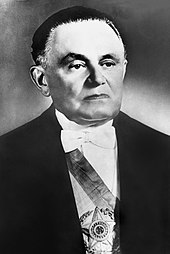Humberto Castelo Branco
Humberto de Alencar Castelo Branco (born September 20, 1897 in Messejana CE , † July 18, 1967 in Mondumbim CE ) was President of Brazil from 1964 to 1967 .
Castelo Branco was the son of a senior officer in the Brazilian military and embarked on a military career himself at an early age. He studied at military academies in Porto Alegre and Realengo in the west of the city of Rio de Janeiro. During the Second World War he was a member of the Brazilian Expeditionary Force and fought in Italy from 1944 to 1945. He then held various high positions in the military and was promoted to general in 1962.
On April 1, 1964, Branco was one of the leaders of the military coup that ousted President João Goulart . As a result, he was the first president installed by the military regime. The Castelo Branco government concentrated on laying and consolidating the foundations for a new regime . After he was originally appointed to rule the term until 1966, he received a constitutional law from Congress, which extended his term to March 15, 1967.
Several laws were passed under his government designed to consolidate the power of the military. In 1965 a law was introduced which prescribed a two-party system. It only allowed the ruling Alliance of National Renewal (Arena) party and a formal opposition party, the Brazilian Democratic Movement (MDB). After opposition candidates won gubernatorial elections in the states of Guanabara and Minas Gerais , indirect elections were introduced for governors and mayors of large cities.
In 1966 there was a series of student demonstrations against the government, but the ruling party still won the general election on November 15, 1966. With its parliamentary majority, the government of Castelo Branco was able to introduce laws to control the press and new security laws. Shortly before the end of the term of office, a law was passed that strengthened the rights of the central government at the expense of the states.
The radical economic reforms of the Castelo Branco regime, though unpopular, brought economic growth, reduced inflation and restored Brazil's creditworthiness abroad.
On March 15, 1967, Castelo Branco's successor, Artur da Costa e Silva , who had previously been Minister of War, was sworn in. Four months later, Castelo Branco was killed in an airplane accident.
Web links
| predecessor | Office | successor |
|---|---|---|
| Pascoal Ranieri Mazzilli |
President of Brazil 1964–1967 |
Artur da Costa e Silva |
| personal data | |
|---|---|
| SURNAME | Castelo Branco, Humberto |
| ALTERNATIVE NAMES | Branco, Humberto de Alencar Castelo (full name) |
| BRIEF DESCRIPTION | President of Brazil (1964–1967) |
| DATE OF BIRTH | September 20, 1897 |
| PLACE OF BIRTH | Messejana |
| DATE OF DEATH | July 18, 1967 |
| Place of death | Mondumbim |
